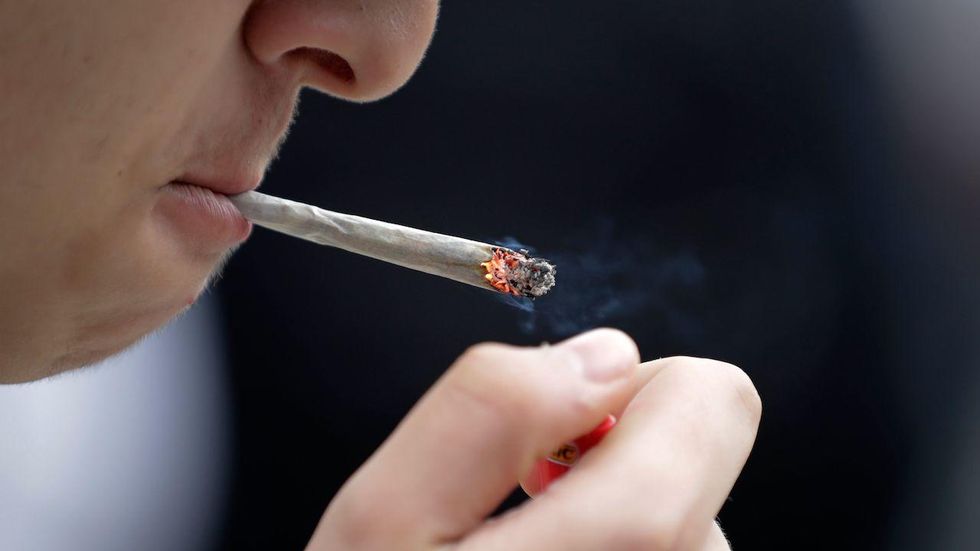
Dozens of states have legalized some form of marijuana use in recent years and many proponents have argued that the drug is safe and not addictive, but more research has proven that theory is wrong. (Thomas Samson/AFP/Getty Images)

Dozens of states have legalized some form of marijuana use in recent years and many proponents have argued that the drug is not only safe, it's not addictive.
But more and more research has proven that theory is wrong and it may be too late to walk back the laws that have at least made pot addiction more common, The Atlantic reported.
“In large national surveys, about 1 in 10 people who smoke it say they have a lot of problems. They say things like, ‘I have trouble quitting. I think a lot about quitting and I can’t do it. I smoked more than I intended to. I neglect responsibilities.’ There are plenty of people who have problems with it, in terms of things like concentration, short-term memory, and motivation,” Keith Humphreys, a professor of psychiatry and behavioral sciences at Stanford University, told The Atlantic.
“People will say, ‘Oh, that’s just you fuddy-duddy doctors.’ Actually, no. It’s millions of people who use the drug who say that it causes problems,” he said.
Marijuana use among adults jumped by 50 percent in 2016 over the percentages from 2002 to 2015, according to the Substance Abuse and Mental Health Services Administration.
And the number of adults who reported having a cannabis-use disorder more than doubled between 2012-13 over 2001-02, according to a research published in the JAMA Psychiatry journal.
There are a number of issues that have health experts concerned, including the increasing levels of THC found in marijuana products and the number of constant users.
“Cannabis is potentially a real public-health problem,” Mark A. R. Kleiman, a professor of public policy at New York University, told The Atlantic. “It wasn’t obvious to me 25 years ago, when 9 percent of self-reported cannabis users over the last month reported daily or near-daily use. I always was prepared to say, ‘No, it’s not a very abusable drug. Nine percent of anybody will do something stupid.’ But that number is now [something like] 40 percent.”
Also, state and local governments are legalizing cannabis without considering potential harm to consumers.
For example, the availability of hyper-potent marijuana products edibles, tinctures, vape pens, sublingual sprays, and concentrates has many experts concerned because scientists don't know how it will affect people's bodies and brains.
“We’re seeing these increases in the strength of cannabis, as we are also seeing an emergence of new types of products,” Ziva Cooper, an associate professor of clinical neurobiology in the Department of Psychiatry at Columbia University Medical Center, told The Atlantic. “A lot of these concentrates can have up to 90 percent THC.”
In 1975, marijuana flowers contained less than 1 percent THC and less than 3 percent more than a decade later. Now, it's easy to find buds with upwards of 30 percent THC, according to Gizmodo.
Marijuana shops have untrained budtenders, who often hand out unscientific medical advice to users.
“I’m most scared of the advice to smoke marijuana during pregnancy for cramps,” Humphreys said.
Also, because marijuana is still illegal under federal laws, there is no safety-testing like those done on pharmaceuticals and no regulations on labeling.
The idea of a loosely regulated, commercialized drug being made available to the masses sets off the alarm button for health experts.
“The reckless way that we are legalizing marijuana so far is mind-boggling from a public-health perspective,” Kevin Sabet, an Obama administration official and a founder of the nonprofit Smart Approaches to Marijuana, told The Atlantic. “The issue now is that we have lobbyists, special interests, and people whose motivation is to make money that are writing all of these laws and taking control of the conversation.”
It's possible to create policy reforms that could reduce problematic use without returning to prohibition.
The District of Columbia doesn't allow commercial sale of marijuana products for recreational use. In D.C., marijuana can be grown at home and gifted among adults.
“If I got to pick a policy, that would probably be it,” Kleiman told The Atlantic. “That would be a fine place to be if we were starting from prohibition, but we are starting from patchwork legalization. As the Vermont farmer says, I don’t think you can get there from here. I fear its time has passed. It’s generally true that the drug warriors have never missed an opportunity to miss an opportunity.”
Legislators could create policies that place monthly purchase limits on THC and there could be limits to the amount of THC in products. Advertising could be banned or limited.
Also, listening to the users who've suffered from cannabis addiction could help educate the millions of users who believe its harmless.